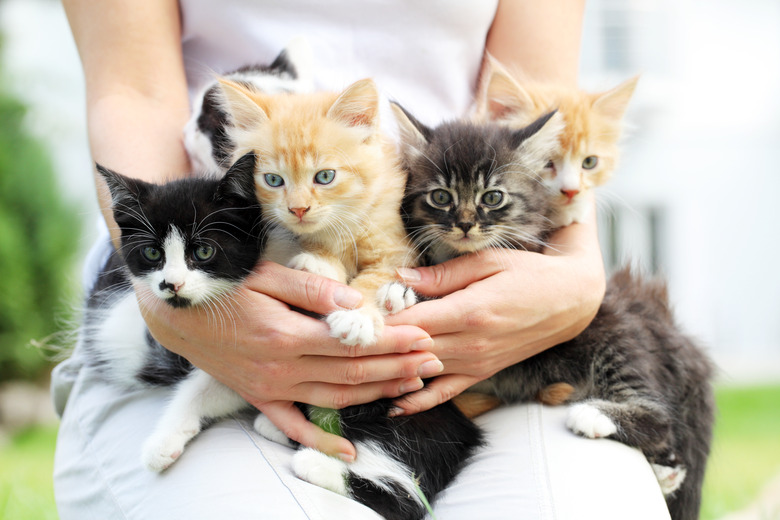How To Care For A Mother Cat After Having Kittens
You've carefully monitored and cared for your pregnant cat all the way up until her delivery. But you don't want to be left suddenly wondering, "My cat just had kittens, what do I do?" The care that you give your mother cat after the birth of her kittens is just as important as the care you provided her leading up to the birth. When you understand your mother cat's changing care needs, you can better support both her and her kittens after the birth.
Cat giving birth problems
Cat giving birth problems
If your cat is giving birth for the first time, familiarize yourself with the types of problems that can occur before the birth takes place. It can take your cat from two to 24 hours to give birth, so you may need to carefully monitor the birth for a while. Keep an eye on the process without disturbing the mother cat, though, by entering the room quietly and staying away as much as possible.
While it's best to let your cat handle the birth herself, sometimes you may need to intervene. As the kittens are born, they'll be in a thin membrane sac, and your cat should remove this sac immediately. If she doesn't, you'll need to tear it open with your hands so that the kittens can breathe. Clean the kittens' nose and mouth and rub them with a dry towel to encourage them to breathe on their own.
Mother cats also usually chew through the kittens' umbilical cord. If your cat has just given birth and doesn't do this, you should cut the cord using sterilized scissors and tie it off about an inch from the kitten's body. Make sure that the remaining cord attached to the kitten is short so that the mother cat doesn't chew on it.
Offer a warm, dry place
Offer a warm, dry place
If you haven't already provided your cat with a nesting box before the birth, be sure to give her and the kittens a warm and dry place where they'll feel safe. Make the box tall enough so that the kittens can't climb out but so that the mother can, and place it in a location without drafts. The box should be large enough so that the mother can move and lie down away from the kittens, but also small enough that the kittens can easily get to their mom.
Because kittens can't regulate their body temperature until they're 3 weeks old, you'll need to make the nesting box cozy. You can use water bottles or a heating pad to warm the box, and should line it with towels or blankets. Make sure that the towels and blankets aren't frayed, since a kitten could get caught up in the strings. If towels or blankets get wet, remove them and replace them with dry ones.
Leave the mother alone
Leave the mother alone
In most cases, it's best to leave the mother cat alone with her kittens as much as possible. The mother cat should take care of the kittens initially, so you won't have to do much more than ensure that the mother is fed and that both she and the kittens appear to be healthy.
Give the mother cat space, but also make sure that she starts nursing the kittens within an hour or two of their birth. If she doesn't nurse or doesn't allow the kittens to nurse, you may need to step in and feed the kittens with milk replacer. Contact your vet if this is the case, since kittens' health can rapidly decline and your vet may want to monitor the kittens.
Increase the mother's nutrition
Increase the mother's nutrition
A nursing mother needs extra nutrition and calories, so feed your cat a high-quality kitten-formula food. Offer plenty of wet and dry food to the mother, and increase the amount of food that you offer so that she always has access to it. Always have fresh water available, too.
Talk with your vet
Talk with your vet
If you have any concerns about your cat's health or the health of her kittens, stay in close contact with your vet. Kittens can get sick very quickly, so monitor them carefully and call your vet immediately if you have any concerns.
Once the kittens are 8 weeks old they'll be ready to be weaned from their mother, but until then you can best help your cat by carefully monitoring her and her kittens and providing them with a safe place where they feel secure.
Always check with your veterinarian before changing your pet's diet, medication, or physical activity routines. This information is not a substitute for a vet's opinion.
